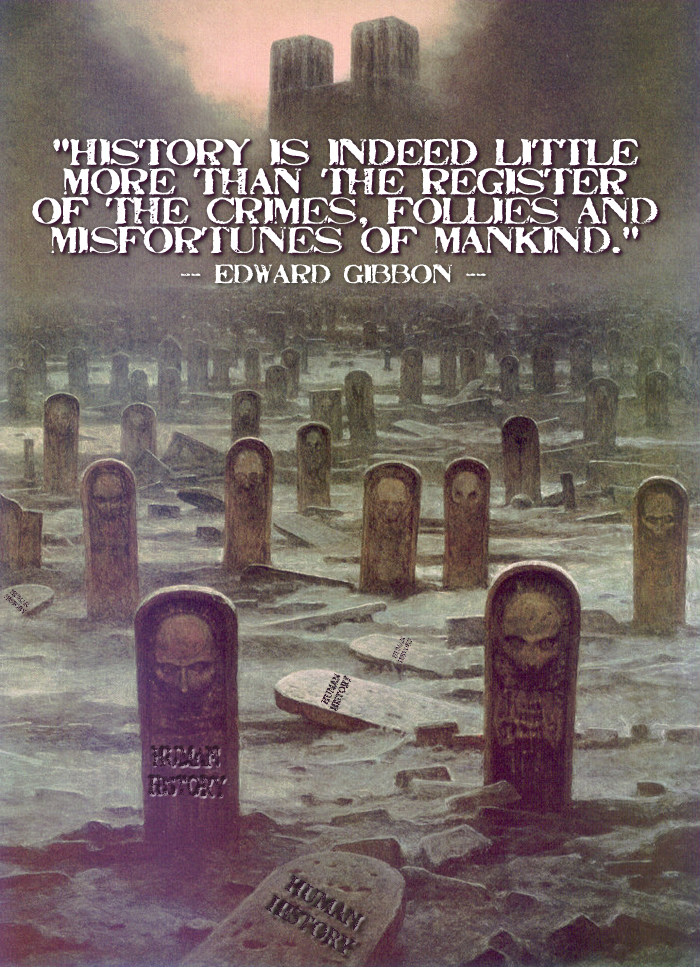Republished by Blog Post Promoter
I heartily recommend that everyone read The History of the Rise and Fall of The Roman Empire, by Edward Gibbon. Personally, it has given me a perspective on the economic, political and religious vested interests that have driven the materialistic evolution of Western Civilization. Understanding our past creates the realization, for me, that we have learned little from history. A nearly total absence of spiritual self-awareness of the beings who create and inhabit Western society has been carefully nurtured since the rise of the Greeks and Romans 3,000 years ago. Corrupt senators, imperialist armies and brutal entertainments of the circus maximus for plebeian mobs still thrive in our daily lives! — Lawrence R. Spencer
Here is more information about Edward Gibbon from Wikipedia.org:
“Edward Gibbon (27 April 1737 – 16 January 1794) was an English historian and Member of Parliament. His most important work, The History of the Decline and Fall of the Roman Empire, was published in six volumes between 1776 and 1788. The Decline and Fall is known for the quality and irony of its prose, its use of primary sources, and its open criticism of organized religion.Gibbon’s work has been criticised for its scathing view of Christianity as laid down in chapters XV and XVI. Those chapters were strongly criticised and resulted in the banning of the book in several countries. Gibbon’s alleged crime was disrespecting, and none too lightly, the character of sacred Christian doctrine, by “treat[ing] the Christian church as a phenomenon of general history, not a special case admitting supernatural explanations and disallowing criticism of its adherents”. More specifically, the chapters excoriated the church for “supplanting in an unnecessarily destructive way the great culture that preceded it” and for “the outrage of [practicing] religious intolerance and warfare”. Gibbon, though assumed to be entirely anti-religion, was actually supportive to some extent, insofar as it did not obscure his true endeavour – a history that was not influenced and swayed by official church doctrine. Although the most famous two chapters are heavily ironical and cutting about religion, it is not utterly condemned, and its truth and rightness are upheld however thinly.
Gibbon’s apparent antagonism to Christian doctrine spilled over into the Jewish faith, leading to charges of anti-Semitism. For example, he wrote:
“Humanity is shocked at the recital of the horrid cruelties which [the Jews] committed in the cities of Egypt, of Cyprus, and of Cyrene, where they dwelt in treacherous friendship with the unsuspecting natives; and we are tempted to applaud the severe retaliation which was exercised by the arms of legions against a race of fanatics, whose dire and credulous superstition seemed to render them the implacable enemies not only of the Roman government, but also of humankind.”
Gibbon is considered to be a son of the Enlightenment and this is reflected in his famous verdict on the history of the Middle Ages: “I have described the triumph of barbarism and religion.” However, politically, he aligned himself with the conservative Edmund Burke’s rejection of the democratic movements of the time as well as with Burke’s dismissal of the “rights of man.”
Gibbon’s work has been praised for its style, his piquant epigrams and its effective irony. Winston Churchill memorably noted, “I set out upon…Gibbon’s Decline and Fall of the Roman Empire [and] was immediately dominated both by the story and the style. …I devoured Gibbon. I rode triumphantly through it from end to end and enjoyed it all.” Churchill modelled much of his own literary style on Gibbon’s. Like Gibbon, he dedicated himself to producing a “vivid historical narrative, ranging widely over period and place and enriched by analysis and reflection.”
Unusually for the 18th century, Gibbon was never content with secondhand accounts when the primary sources were accessible (though most of these were drawn from well-known printed editions). “I have always endeavoured,” he says, “to draw from the fountain-head; that my curiosity, as well as a sense of duty, has always urged me to study the originals; and that, if they have sometimes eluded my search, I have carefully marked the secondary evidence, on whose faith a passage or a fact were reduced to depend.” In this insistence upon the importance of primary sources, Gibbon is considered by many to be one of the first modern historians:
In accuracy, thoroughness, lucidity, and comprehensive grasp of a vast subject, the ‘History’ is unsurpassable. It is the one English history which may be regarded as definitive. …Whatever its shortcomings the book is artistically imposing as well as historically unimpeachable as a vast panorama of a great period.”
REFERENCE: WIKIPEDIA.ORG

